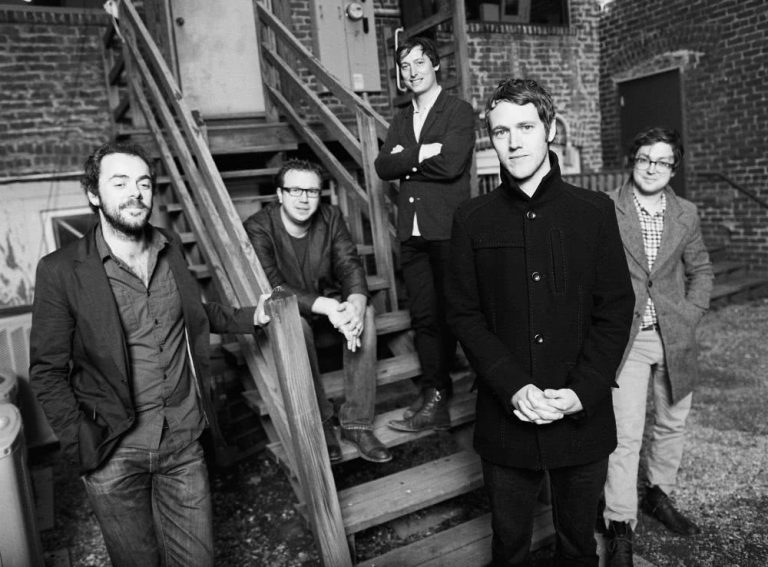In 1998, the UK was entering a post-Britpop malaise. Be Here Now had failed to live up to the colossal expectations that followed (What’s The Story) Morning Glory. And bastions of the genre Blur had, with their eponymous 1997 album, moved in a radically different musical direction – distancing themselves from the movement and choosing to instead take influence from American indie rock acts.
Considering this climate of listlessness, Merseyside band Gomez, with their debut album Bring It On, were a welcome breath of fresh air. With its swampy overtones, sprawling guitar experimentation and Ben Ottewell’s distinctive, smoky howl, the record drew heavily from blues rock and neo-psychedelia, eschewing the brightness and sunny optimism of Britpop. At the end of the day, it had more in common with Mellow Gold than Parklife.
“The headspace was quite mangled, and fueled by… things that impacted the creative aspect – which probably accounts for some of the more bizarre psychedelic parts,” laughs the band’s bassist Paul Blackburn. “At the time, we were feeling there was kind of a gap in the market. We were into certain types of music that didn’t seem to be being made at the minute, so we mostly decided to make it for ourselves.
Forming in late 1996, Gomez had barely played a show by the time labels began descending on the group. With their earnest beginnings as a gaggle of school friends, fresh out of university and taping jam sessions in the garage of the house they shared together, the band could barely have expected the bidding war that would result from their home-recorded offerings.
“We had these demos and then it turned into a bit of a record company circus, which was overwhelming. One minute we were talking to a small label in Sheffield through our manager at the time, Steven Fellows, and then someone he knew that he’d worked with had more contacts in the industry and they’d passed it across to other people. The next minute we were playing showcases to big companies like Island, Virgin and EMI. It started to become quite surreal.”
The band eventually signed with Hut Records, a subsidiary of Virgin, and began recording what would become Bring It On. Going against the grain with its hybrid of styles and esoteric sonic textures, the band’s idiosyncratic approach would pay off – the album would go on to win the Mercury Music Prize that year, beating out the likes of Pulp’s This Is Hardcore and The Verve’s ‘Bitter Sweet Symphony’-boasting Urban Hymns.
When you’ve played them so many times you find new ways of playing them.
“I think that’s basically what a lot of people appreciated about it,” says Blackburn. “It was coming from a different angle, which is why we started doing our own music in the first place. We had something we wanted to say and to a certain extent, it wasn’t with the idea that people were necessarily going to listen to it.”
Following the album’s success, Gomez would go on to release six more albums and tour across the globe. While Bring It On laid the groundwork for the rest of their career, further albums explored varying sonic territory.
“I don’t think we’ve got the patience or concentration span to stick with one thing for very long,” comments Blackburn. “You’ll have bands that are more known for sticking to a particular genre and keeping the style of their music within closer boundaries. but we’ve always been quite experimental.”
Two decades after the album’s release, Gomez are returning to Australian shores to commemorate the anniversary of Bring It On – what Blackburn jokingly refers to as the “look at us, we’re old” tour – including an appearance at this year’s Bluesfest and a handful of headline shows. For Blackburn, part of the excitement is simply touring again – the band have not done so for around six years.
And while the band has its first rehearsal together within a couple of weeks, Blackburn says he’s been having a quick look at the songs when he’s been able to find a spare minute in between his newfound parental responsibilities (he starts the interview pre-emptively apologising for the occasional noise of a one-year old in the background.)
“Some of them it’s like getting back on a bike because we’ve played them so many times in the past,” Blackburn says of the band’s obscurer catalogue. “The ones we haven’t played so much there’s a bit of figuring out and trying to remember what was played at the time.”
We were friends before the band started, and it feels more like family than a work thing.
Given the album’s hazy, layered sound, it’s understandable that there’d be songs on Bring It On that are practically impossible to perfectly recreate. “There’s always been a bit of live interpretation,” explains Blackburn. “When you’ve played them so many times you find new ways of playing them, or you’ll hear new things you’ve not heard at the time, like these weird dynamic shifts. The re-interpretations keep it exciting for everyone.”
Over 20 years since their initial formation, Gomez are one of the few bands of the era to have continued with their original lineup, with all five founding members still part of the band. “We were friends before the band started, and it feels more like family than a work thing. You take the rough with the smooth,” says Blackburn.
Gomez will play this coming Bluesfest (Thursday March 29 – Monday April 2), or you can catch them at The Enmore on Saturday March 31.


































